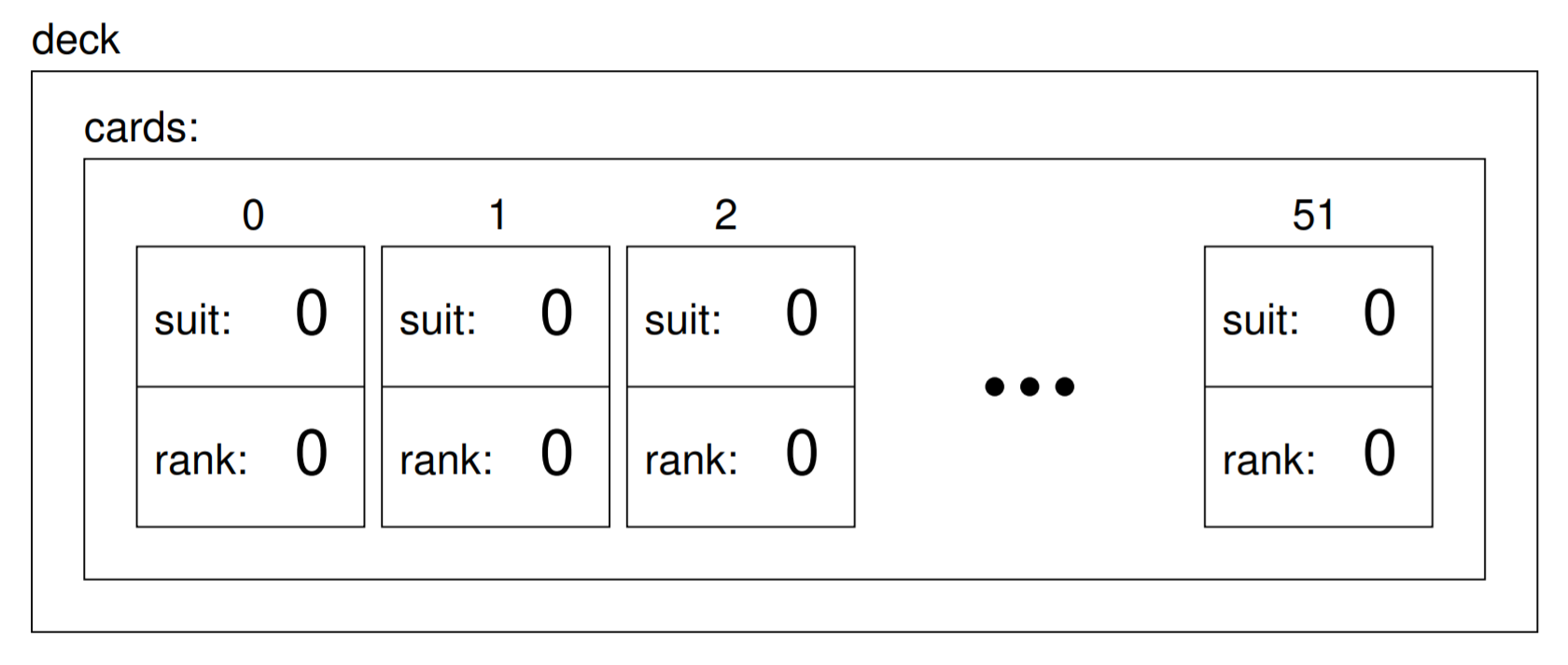Section 13.3 Decks
In the previous chapter, we worked with a vector of objects, but I also mentioned that it is possible to have an object that contains a vector as an instance variable. In this chapter I am going to create a new object, called a
Deck, that contains a vector of Cards.
The structure definition looks like this
struct Deck {
vector<Card> cards;
Deck(int n);
};
Deck::Deck(int size) {
vector<Card> temp (size);
cards = temp;
}
The name of the instance variable is
cards to help distinguish the Deck object from the vector of Cards that it contains.
For now there is only one constructor. It creates a local variable named
temp, which it initializes by invoking the constructor for the vector class, passing the size as a parameter. Then it copies the vector from temp into the instance variable cards.
Now we can create a deck of cards like this:
Deck deck(52);
Here is a state diagram showing what a
Deck object looks like:

’deck’ names a box. Inside it is a box named ’cards’. Inside ’cards’ is a sequence of 52 numbered boxes each with ’suit: 0, rank: 0’.
The object named
deck has a single instance variable named cards, which is a vector of Card objects. To access the cards in a deck we have to compose the syntax for accessing an instance variable and the syntax for selecting an element from an array. For example, the expression deck.cards[i] is the ith card in the deck, and deck.cards[i].suit is its suit. The following loop
for (int i = 0; i < 52; i++) {
deck.cards[i].print();
}
demonstrates how to traverse the deck and output each card.
Checkpoint 13.3.2.
Take a look at the state diagram above. When we create a deck of cards using
Deck deck(52), what is true about our new deck?
- The ranks and suits of the cards are initialized to the proper ranks and suits in a standard deck of cards.
- Unless you the programmer tell it to, the computer won’t do it.
- There will be 52 cards.
- We initialized cards with a value of 52.
- The ranks and suits will be initialized to their default values.
- In our case is, the default values are zero.
- The only instance variable in the deck is cards.
- cards is a vector of Cards!
- You can’t access individual cards in the deck.
- You can access any card by indexing, for example: deck.cards[n].
Checkpoint 13.3.3.
- True - because this is the default mapping of enumerated types.
- The default mapping begins with 0.
- True - because our definition of rank overrides the default mapping.
- Our definition doesn’t use the default mapping, which begins with 0.
- False - because this is the default mapping of enumerated types.
- The default mapping begins with 0.
- False - because our definition of rank overrides the default mapping.
- If we wanted to, we could have set the rank of ace to 7, and the rest of the cards would still be ranked in order.
You have attempted of activities on this page.
